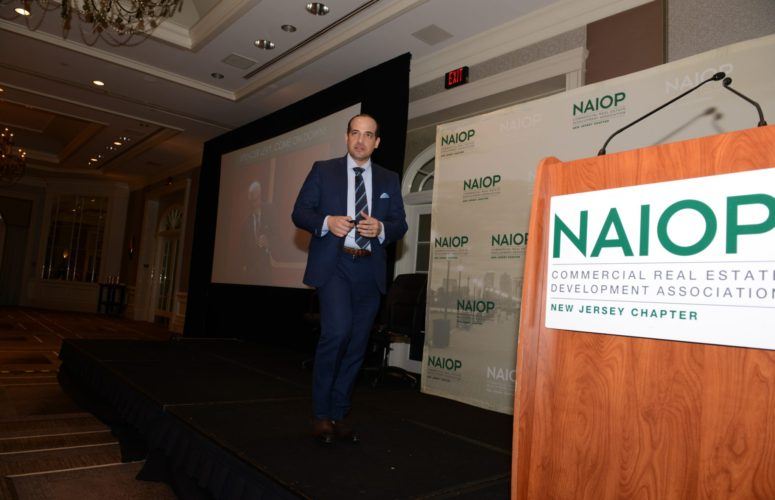
Real Estate Outlook and Trends are Discussed at NAIOP’s Annual Event
By Jim Pytell, Assistant Editor On Jan 23, 2018At NAIOP New Jersey’s 2018 Annual Meeting and Commercial Real Estate Outlook last night, industry leaders shared their expertise with a sold-out crowd of industry professionals, who were eager to hear what the New Year may have in store when it comes to real estate and the economy.
The event was NAIOP’s first big gathering of 2018, and was held at the Hilton in Short Hills. NAIOP President and CEO Tom Bisacquino shared insights on federal tax reform efforts, as well as trends across the country. Additionally, Spencer Levy, senior economic advisor for CBRE and a senior member of the company’s global research team, delivered a dynamic and engaging keynote presentation on the economy and the forces that will shape the office, industrial, retail and residential real estate markets in the coming year.
Speaking about the impact that the new tax plan in Washington will have on the commercial real estate industry, Bisacquino said, “The old adage in our industry is that a landlord cannot do better than his or her tenant. So if it’s good for corporate America, and if we believe that corporate America will expand and prosper under this bill, it should have a positive effect on the demand for our space.”
Levy added that the real estate sectors that will disproportionately benefit the most from the tax plan include retail and multi-family.
“A disproportionate amount of the benefits from this [plan] are going to people at the median income and below. When these people get another dollar, they spend it as opposed to people in higher tax brackets who will invest or save,” said Levy.
“If the plan does what it is supposed to do, which is stimulate growth by having more liquidity, more money coming back, and a lower cost of capital by lower tax rates – then office and industrial should benefit too,” he added.
Conceding that New Jersey is in fact a high tax state, Levy explains that the state still has some of the best talent, live-work-play environments, and infrastructure in the nation, which will keep people wanting to do business in the state.
“New Jersey has a very similar profile to the broader United States in terms of its industry mix – this is your best protection. The diversity of the industries here will protect New Jersey over the long term,” said Levy, who added he’s bullish on education and healthcare services in particular, which, according to him, will be durable during a potential recession.
Talking about industrial real estate, Levy said that the past five years have been the “golden era” for the sector. However, everyone knows this, and as a result, big box industrial has gotten very expensive.
“We are advising our clients to move down the chain to smaller industrial. We are seeing large institutional investors move into this smaller [industrial], because everyone wants to get their goods to market quicker, and this makes that possible,” said Levy. He pointed out how Best Buy was able to transform its business by merging industrial and retail, using its storefronts as more of a showroom for products, while keeping product in the same location to be shipped out to customers who order online.
“The No. 1 disruptor of retail isn’t e-commerce, its demographics,” said Levy. “It is changing population patterns, and money moving in and out of neighborhoods. Even if a certain type of retailer is no longer viable, they can replace it with something else, like a restaurant or a gym. Experienced retailers can go into those areas and have strong rooftops.”
Related Articles:





